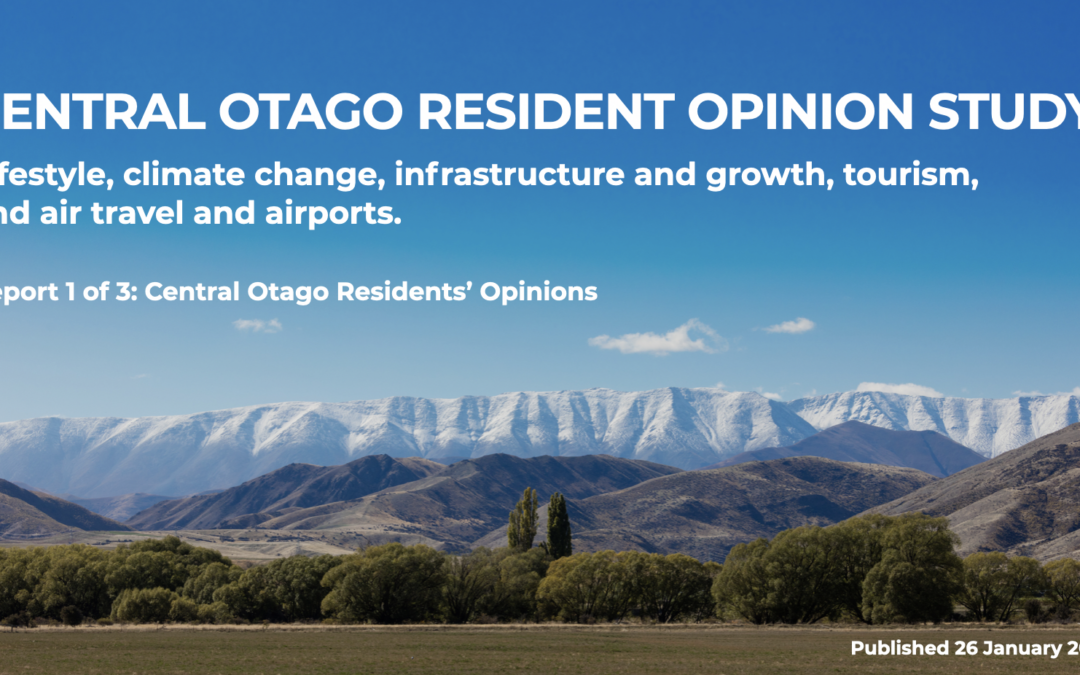A study involving researchers from four universities has been hailed as “the most extensive research of its kind” ever conducted in Central Otago. The first of three reports was released today, making available key findings about Central Otago residents’ views on a number of topics.
The research, conducted late last year, covers five topics: Central Otago lifestyle, climate change, infrastructure and growth, tourism, and air travel and airports. Respondents chosen at random from right throughout the Queenstown Lakes and Central Otago districts were asked over 70 questions, and were also given the opportunity to comment openly on all topics.
The survey revealed a strongly unified population sharing many values, beliefs and concerns. 89% of respondents lived in or visited the region for its ‘lifestyle’; other natural factors, such as climate and landscape, also figured extremely highly. Other factors, such as ease of travel and work opportunities, were regarded as less important. There was a high level of concern about climate change and environmental sustainability in the region, and strong support for a greater focus on the value of visitors rather than the volume.
63% of respondents were opposed to the proposed Central Otago Airport (and 51%, strongly opposed) compared to 22% in favour. This level of opposition was found right across the Central Otago and Queenstown Lakes districts.
Professor Robert McLachlan of Massey University, one of the three researchers leading the study, said the proposal to build an international airport at Tarras is “not just a local issue” as it is significant for New Zealand as a whole. “It’s a national issue that can only be resolved by a national plan for aviation emissions that meets our international agreements. With the sixth largest per capita aviation emissions in the world, and as a country that relies on aviation for so many things, New Zealand has to take action.”
Professor James Higham of Griffith University and the University of Otago commented that there were strong themes running through the responses. “There is no doubt that people choose to live in Central Otago for the same reasons that tourists want to visit. It is a superbly beautiful, unspoilt and tranquil place. It’s clear from our research that sustainability is now a very high priority for the people of Central Otago, and they also very clearly understand the impact of tourism that the region benefits from. This study shows that they want better tourism with less impact, rather than more tourists.”
Professor James Renwick of Victoria University of Wellington said that the impacts of climate change are clearly on Central Otago residents’ radar, which is consistent with research conducted elsewhere. “People are conscious that we have to do everything we can to get New Zealand to net-zero, and that we all have to play our part. We’re seeing people do that in numerous ways including solar energy, reducing waste to landfill and reducing unnecessary travel. Aviation can be a significant portion of people’s footprints – especially where flights are medium to long haul.”
The researchers are releasing findings in three parts. Today’s report reveals the preliminary insights. A second report, due out next month, will present an analysis of all detailed written responses, which were described as “extensive” and “showing very high levels of engagement and understanding of the issues as seen by Central Otago residents themselves.” A third report, scheduled for April 2024 will represent the results of bivariate analyses to uncover the relationships between responses to different questions.
The report can be downloaded at https://informedleaders.com/central-otago-study/ from 26 January 2024.

